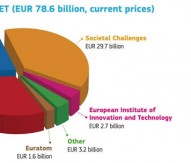
European Commission replies to ‘One of Us’
The European Commission has replied to the European Citizens’ Initiative ‘One of Us’. After having met with the organisers of the initiative and studied their request, the Commission has decided not to submit a legislative proposal, given that member states and the European Parliament have only recently discussed and decided EU policy in this regard.
The ‘One of Us’ initiative had asked the EU to end the financing of activities which presuppose the destruction of human embryos, in particular in the areas of research, development aid, and public health. The organisers of the initiative had collected more than the requisite one million signatures from at least seven EU member states after registering their proposal.
Máire Geoghegan-Quinn, European Commissioner for Research, Innovation and Science, said: “We have engaged with this Citizens’ Initiative and given its request all due attention. However, member states and the European Parliament agreed to continue funding research in this area for a reason. Embryonic stem cells are unique and offer the potential for life saving treatments, with clinical trials already underway.”
The organisers met with the Commission on 9 April and then had a public hearing in the Parliament on 10 April. The Commission concluded that the existing funding framework, which was recently debated and agreed by EU member states and the Parliament, is the appropriate one.
European Commissioner for Development, Andris Piebalgs, added: “Pregnancy and childbirth related complications are still today the cause of death of too many women. That is why the international community included a specific target to reduce maternal mortality and achieve universal access to reproductive health as one of the Millennium Development Goals. The EU, its member states and other international donors are working hard to achieve this and have made this, and health more generally speaking, a priority.”
The European Commission applies a detailed ‘triple lock’ system with regards to any research involving human Embryonic Stem Cells, a system which it considers in full accordance with the EU Treaties and the Charter of Fundamental Rights of the European Union. The system was agreed by EU member states and the Parliament in the context of approving Horizon 2020 legislation in 2013.





